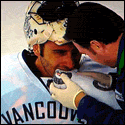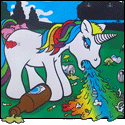|
oh cool, I went looking for this and couldn't find it. Thank you!
|
|
|
|

|
| # ? May 10, 2024 08:17 |
|
So, I'm a really novice writer, and I've recently started a new project. It's both my first serious first-person-perspective project, and my first serious project with a female protagonist. Now, I haven't fallen into any of the obvious traps that have been brought up in the last few pages, like having the character objectify herself in a blatantly male way. But I'd just like to ask: Are there any other potential pitfalls I should watch out for? On an unrelated note (well, it's related in that it's about the same project), I've been wary of worldbuilding, because in my experience and observations, writers who don't know exactly what they're doing with worldbuilding can get caught up in an endless loop of self-congratulating, masturbatory sperging for the sake of it. Do the other writers in this thread have any advice on balancing worldbuilding with more substantive, character-based and theme-based storytelling? How should exposition be handled to avoid turning your novel into a fictional, and therefore useless, edition of Encyclopedia Britannica?
|
|
|
|
LaughMyselfTo posted:How should exposition be handled to avoid turning your novel into a fictional, and therefore useless, edition of Encyclopedia Britannica? If you think you could cut it out and people would probably still understand, cut it. You can always get someone to read it later and they'll tell you if they're confused about anything. It doesn't hurt for you to come up with a detailed setting and backstory but that's probably not what people are going to want to read, so think about it yourself as you're writing to give you a better idea of how things should go but don't actually go into details about it in the story. Most of the time these sort of things become apparent without being directly addressed. And anything that has a direct and important impact on the plot and characters will probably be discussed at some point, so you can slip a bit of exposition in there.
|
|
|
|
LaughMyselfTo posted:So, I'm a really novice writer, and I've recently started a new project. It's both my first serious first-person-perspective project, and my first serious project with a female protagonist. Now, I haven't fallen into any of the obvious traps that have been brought up in the last few pages, like having the character objectify herself in a blatantly male way. But I'd just like to ask: Are there any other potential pitfalls I should watch out for? 2. It all depends on the genre, but I tend to think that the best world building is the kind that unfolds naturally within the narrative - the kind that doesn't stand out as an encyclopedia suddenly opening mid-exposition, breaking the prose of the story with wonderful made up facts. It can be tough to do depending on what you're having to explain, but the payoff is really great when you pull it off.
|
|
|
|
LaughMyselfTo posted:So, I'm a really novice writer, and I've recently started a new project. It's both my first serious first-person-perspective project, and my first serious project with a female protagonist. Now, I haven't fallen into any of the obvious traps that have been brought up in the last few pages, like having the character objectify herself in a blatantly male way. But I'd just like to ask: Are there any other potential pitfalls I should watch out for? Post a bit that you're worried about and we'll give you some more specific feedback.
|
|
|
|
LaughMyselfTo posted:On an unrelated note (well, it's related in that it's about the same project), I've been wary of worldbuilding, because in my experience and observations, writers who don't know exactly what they're doing with worldbuilding can get caught up in an endless loop of self-congratulating, masturbatory sperging for the sake of it. Do the other writers in this thread have any advice on balancing worldbuilding with more substantive, character-based and theme-based storytelling? How should exposition be handled to avoid turning your novel into a fictional, and therefore useless, edition of Encyclopedia Britannica? The best way to weave in world details is to have people act like everything's normal when doing things differently from the way we do things. The most famous example is Heinlein's "the door dilated," which gives us an immediate picture that this is the future without pulling the reader out of the story. Small bits of exposition is ok when you can't get around it though. Your narrator, in any PoV, is allowed to explain things in a few quick sentences when necessary. Bad exposition is droning on for paragraphs. I keep worldbuilding and backstory notes, most of which never make it into the story. Writing it down elsewhere helps me avoid plopping exposition awkwardly into the story as I think up the details. Having it straight in my head means it flows naturally when I sit down to write a scene. I have a big book of Harlan Ellison stories, which has some accompanying essays about writing. He talked about how he knew exactly what a certain character's apartment looked like, which never made it into the story, but it was there as part of her story every time he got her to act on the page. Those notes are for you. When you know your characters and world inside out, it shows through. Beta readers are great for telling you if you're under or overexplaining. It's not something you should worry about while writing the first draft. Some people write too much in their first draft and some people (like me) write too little. When you write too much, your reader response will be, "This is boring." When you write too little you'll get, "I'm confused." Most of the people who wank about worldbuilding are the kind who either never get a story written at all, or think their first draft is the complete manuscript, only needing a quick polish for grammar. Anyone who realizes it takes multiple revisions to turn out a decent story is self aware enough to correct their exposition flaws when pointed out. So I say again, don't worry at this point, just get it down on the page. Also, for a great example of weaving in massive world details without stopping to explain a thing, read Alfred Bester's The Stars My Destination and skip the (most likely obtuse editor demanded) prologue. It'll make your head spin at first because he just piles on the crazy and lets the reader sink or swim. It's beautiful. Stuporstar fucked around with this message at 22:27 on Nov 26, 2012 |
|
|
|
 Chickencheese is here! Chickencheese is here!   Advice and discussion about the rarely-discussed Chickencheese fiction genre would be appreciated in the thread, thank you.
|
|
|
|
I want to make a chickencheese but I'm physically disgusted by both chicken and cheese. CC, how do I become an overnight Chickencheese sensation? How do I make ultimate CCCC?
|
|
|
|
SurreptitiousMuffin posted:I want to make a chickencheese but I'm physically disgusted by both chicken and cheese. CC, how do I become an overnight Chickencheese sensation? How do I make ultimate CCCC? I suddenly feel like buying you a doganusatar.
|
|
|
|
I've given up the Chickencheese idea. I went to the fridge and I was out of cheese so that's off the cards forever. What I thought I might do was make an anime based off chickencheese. I've seen lots of anime and I eat lots of four-cheese pizza so I'm pretty much an expert. Then I could move to Japan and be a mega-famous chickencheese manganaka.
|
|
|
|
SurreptitiousMuffin posted:I've given up the Chickencheese idea. I went to the fridge and I was out of cheese so that's off the cards forever. Dude, we've seen people like you come through CC before, throwing their poo poo around all monkeylike and expecting the regulars to help you craft it into a beautiful, majestic chickencheese. So excuse me if I come across as hostile and short-tempered. What is this  GLORIOUS NIPPON chickenshit? You think just because you watch some cartoon animes you're suddenly an expert on Japanese culture? You want to mash all your favorite cartoon anime-manga-hentai cliches into a giant robot tit pantyshot kungfu-karate fighting perfect storm of kawaii chickencheese-san horror, and expect the superior people of GLORIOUS NIPPON GLORIOUS NIPPON chickenshit? You think just because you watch some cartoon animes you're suddenly an expert on Japanese culture? You want to mash all your favorite cartoon anime-manga-hentai cliches into a giant robot tit pantyshot kungfu-karate fighting perfect storm of kawaii chickencheese-san horror, and expect the superior people of GLORIOUS NIPPON  to immediately see your pimply white neckbeard genius and make you the king of mangakatanas with like six hot Japanese waifus with color-coordinated hair and outfits. Seriously, dude, do you even know how to draw, let alone draw a big-titted robot chicken with six guns on robot arms coming out of her vagina? Get the gently caress outta here with this chickencheeseshit. to immediately see your pimply white neckbeard genius and make you the king of mangakatanas with like six hot Japanese waifus with color-coordinated hair and outfits. Seriously, dude, do you even know how to draw, let alone draw a big-titted robot chicken with six guns on robot arms coming out of her vagina? Get the gently caress outta here with this chickencheeseshit.
|
|
|
|
I was kind of contemplating writing about Chickencheese, but can I do it as a non-American? I mean I've never had a chickencheese before, but I've seen pictures. I've also spend a lot of time reading about them. Also,I don't really like the cheese you're supposed to use, so I was thinking about making it a European cheese. Like Raclette or Cancoillotte. Would that still work? I also don't like to cook very much, so how would I describe the process without actually cooking one?
|
|
|
|
Molly Bloom posted:I was kind of contemplating writing about Chickencheese, but can I do it as a non-American? I mean I've never had a chickencheese before, but I've seen pictures. I've also spend a lot of time reading about them. Listen, if you don't eat chickencheese and don't even cook then what makes you think you can make a loving chickencheese, much less write about one? Look at all the drat pictures you want, but if you don't even put in the time to learn about the art of chickencheese, or, at the bare minimum, pick up a cookbook that describes chickencheese, what makes you think you can just go and make an amazing chickencheese that everyone will want to eat? Go ahead and do it if you really want to, but the only person that's going to ever read about your chickencheese, or even eat it, is you. Maybe you'll give one to your beloved mother or fawning girlfriend (haha like you have one)but they're just going to appease you and tell you your chickencheese is amazing just because they have to. If you really want to get some good feedback, considering joining a cooking class. Hell, what do I know though? Maybe you'll create this amazing fringe avant-garde chickencheese book that will be amazing and make Ferran Adria jealous.
|
|
|
|
I had this idea of making a Mexican-style chickencheese as a quesadilla, and putting it in a panini press to give it life-like grill marks. On the other hand, paninisis are Italian or something like that. Considering that I've never ventured into either Mexico or Italy would this make me seem racist or should I just leave the origin vague and let the reader figure it out for themselves? I've heard about the "show don't tell" rule but I also don't want to create a spice-less, bland chickencheese.
|
|
|
|
e: Wrong Thread
sebmojo fucked around with this message at 23:25 on Nov 28, 2012 |
|
|
|
I always seem to have issues with transitions from one scene to the next. I have difficulty deciding what to describe and what not to. For example, someone walks into an office building after driving there and enters the elevator. Assuming nothing is remarkable story-wise with the room, would I skip straight to the elevator, annex the room thing to the paragraph where the character is driving, or write a short paragraph acknowledging the room's existence? For a second example, what if neither the elevator nor the room is remarkable and I just need to get the guy to the meeting. Would I just skip the whole thing entirely, with a "Later, I arrived at the meeting..."
|
|
|
|
dromer posted:For a second example, what if neither the elevator nor the room is remarkable and I just need to get the guy to the meeting. Would I just skip the whole thing entirely, with a "Later, I arrived at the meeting..." Yes. Focus on the scenes, and only bother with transitions if they add something to the story.
|
|
|
|
dromer posted:I always seem to have issues with transitions from one scene to the next. I have difficulty deciding what to describe and what not to. Just start the next segment. If you say something about a man in a room, then suddenly he's in a taxi writing something down, the reader gets it. It's not like someone is out there tearing their hair out saying "DID HE TAKE THE STAIRS OR THE ELEVATOR OH MY GOD I CAN'T LIVE THIS WAY!!!" Hemingway was great at eliminating transitions without jarring the reader one bit. I would avoid a phrase that starts with "Later,..." though because it's implied. You're writing one sentence after the other, we know it's later. So, to use your example, here's what I would do: quote:On the street, there was no valet so he parked it diagonally in the loading zone and walked inside. Upstairs, Reg sat at his oversized desk that looked like it was sinking into blood red quicksand. Thomas stepped across the soft hushing carpet and barked, "Don't I pay for loving valets? If I'm paying I better see them."
|
|
|
|
dromer posted:I always seem to have issues with transitions from one scene to the next. I have difficulty deciding what to describe and what not to. Along with what Overwined said, if you want to give an impression of the journey, just hit the highlights with your character. Susanna swooped across a lane of traffic to take the only parking spot on the street and stormed across the road. She was too angry to acknowledge the greeter or worry about the old elevator's usual rumblings. But as she went down the hall, the thick carpet swallowed up the businesslike clack of her heels. The heavy hush in the air made her wonder if she were late. She put the side of her fist to one of the heavy meeting room doors and shoved. That could probably have been done better. But I'm trying to suggest she drove, it's a busy street, an old building, the lobby is staffed with someone that knows her, and at least one upper floor is pretty luxurious. I'm just keeping the focus on her. Most readers will assume she parks before crossing the road. It lets me show her mood and if I want to spend time on one room later the reader has a feel for the place. But if I'd spent the whole previous page on how mad she was and I'll never use this location again, I'd just write "Susanna held her temper until she entered the meeting room."
|
|
|
|
This is a helpful conversation for me, because I often feel like I'm obligated to narrate every bloody thing that happens between Point A and Point B, especially when I begin to get tired or distracted. (When I'm energized and focused, my judgment on what to include and how to include it is much better, and transitions are much more fluid.) I have to remind myself that if I'm bored writing it, readers will likely be bored reading it.
|
|
|
|
I'm writing a short story in first person present tense. I'm that guy.
|
|
|
|
FauxCyclops posted:I'm writing a short story in first person present tense. I'm that guy. good psot.
|
|
|
|
Thank you! The hardest part of writing always seems to be getting over your inner critic. I just set out to write something, to flex my muscles, but I can't silence the thoughts that keep telling me it's all garbage.  Tartarus Sauce posted:This is a helpful conversation for me, because I often feel like I'm obligated to narrate every bloody thing that happens between Point A and Point B, especially when I begin to get tired or distracted. (When I'm energized and focused, my judgment on what to include and how to include it is much better, and transitions are much more fluid.) I do this as well. If a character has to drive across town for some reason I feel like if I don't narrate him flipping off somebody driving under the speed limit or detail him finding a parking space, I'm not describing enough.
|
|
|
|
I'm not sure if anyone's posted anything like this earlier in the thread, but here's a handy tool I use for keeping my filing straight doing short-story submissions. I work semi-pro (have been paid for my work, but not as recently as I'd like) and I wanted to stress the importance of getting a good filing system down by posting a template of what I used for filing submissions: Basically, when I've got a final draft of something, first thing I do is I figure out which market it fits in best. This goes back to the importance of being a WELL-READ writer--reading the periodicals you aspire to submit to means learning what styles they eat. It'll take some time but, gently caress, you're a writer; if you feel like your time is too valuable, go be a doctor or something. Anyway, I pick my market and then I paperclip the rap sheet for the place I'm submitting at to my print copy of the work. (Usually this ends up being a first draft marked all to hell with pens, but you know, save the trees and all that.) Fill out the info on the work you're submitting and pop that bitch on the corkboard. That work is officially dead to you now--let it rot while you go work on something else. A lot of rags will give an estimate of their turnaround time and I usually put the title of the story in submission on one of those wall-mount calendars on that date as a reminder to check in if I haven't heard back from them in a while. You might also get some mileage putting a strike sheet on your copy of the story so you can keep track of how many times it's been bounced and get a feel for when it's time to put it out to pasture. (Hint: It's not after the first rejection unless you read it again and realize it's "Finnegan's Wake" but without all the talent.) When a story is rejected, you circle "reject", put the date you heard back from them on there, and any notes of encouragement or critiques the editor sent you. ("Please submit again in the future" might be part of a boilerplate rejection sheet but assume it's a genuine request anyhow and take them up on their offer again as soon as you have something in their genre.) Now, if the work sells, here's what you do: You circle accept and, unless they have a stipulation about a waiting period before resubmitting after acceptance (some mags do so read your submission guidelines CLOSELY), the rap sheet goes back in your folder of periodicals, ready for a new story. Eventually you'll get a contract; you want to print out your copy of that, staple that to your final, print draft and toss that in the "sold" folder. If the whole process (post-sale) takes longer than three minutes to do, then you're doing something bad wrong--the whole point of this is to streamline the business side of things so you don't need to think about it so much. Remember: Writing is half art, half craft, and you get better at both by doing the thing a lot. So do it a lot and gently caress the rest. When I'm filling out one of my rap sheets, here's what I put on it: Name of the Periodical: Subtitle to the periodical WEBSITE: https://www.thewebsitename.com (/thepage/thesubmission-guidelines.areon) EDITOR-IN-CHIEF: Name EDITOR-UNDER-CHIEF: Name ANYONE ELSE WHOSE NAME YOU SHOULD BE ADDRESSING IN A PROFESSIONAL MANNER ["THANK YOU FOR YOUR TIME AND CONSIDERATION"] IF YOU WANT TO MAKE IT IN THIS BUSINESS: Names STORY TYPES: This is for broader genres, but also for anything particular that sets them apart from the other magazines, i.e. a special content requirement or sub-genres that they mention by name in their submission guidelines. NOTES: I tend to leave a lot of space under here for new entries so that I can write in my notes when I'm reading their latest issues. KNOW. YOUR. MARKETS. This is also a good place to put unusual caveats to their submissions. LENGTH: Over-under as specified under their content headings. A lot of magazines will state up-front if they prefer shorter fiction from relative unknowns and this is a good place to put notes on that too. SUBMISSIONS: theemail@which.youshouldsendyourstory.to (SUBJECT: any special notes about how they like the email itself formatted) / "Uses online submission form." (A lot of magazines do.) FORMAT: Any particular formatting for the layout they list on their submissions page, accepted filetypes (often .doc, .rtf), and whether they want a cover letter and what they want on it. SIMULTANEOUS: Whether they accept simultaneous submissions that are going to other publications as well (assume NO) MULTIPLE: Whether they accept multiple submissions of different stories to their publication at once (assume NO) PAYMENT: $$$/word for first # words, $$$/word after, $$$/line of poetry, etc., etc. RIGHTS: Some magazines don't say upfront what rights they're buying, but a lot of them do. If they don't just leave this blank with enough space to fill in when you sign the contract. If they DO buy something from you, make sure you double-check their contract against your filing listing to make sure it jibes with what you had here before and if not, sleuth it out a bit and figure out where the miscommunicae came from and update your filings. TURNAROUND TIME: Many magazines have listed the time it takes them [("'usually'")] to get back to you and this helps you ballpark how long it'll be before you should start sending out search parties. This is also a good place to put particular notes from their submissions page about how to contact them if you haven't heard from them within the allotted time estimate. Now, if your submissions are going through the mail, you'll want to format this a little differently by adding a section with their mailing address so that you have that handy for your cover letter and your envelope. Otherwise, though, the basics above apply to pretty much any market you're working with. Hope this is helpful to some of you--it certainly helped me avoid a story I don't want to edit, for an hour or so, anyway. Writers Keep Writing. Vague Optimism fucked around with this message at 07:06 on Dec 4, 2012 |
|
|
|
FauxCyclops posted:I'm writing a short story in first person present tense. I'm that guy.
|
|
|
|
It's a joke. First person present tense has been highly contentious in all of the writers' groups and forums I've been to. My friend also received a rejection letter that lambasted his use of it. It is rather common in bad fanfiction. This is not to say it can't and hasn't been used very well. I'm kidding.
|
|
|
|
So are you saying that we should all expect your use of first person present tense to be the equivalent of bad fan fiction, except not really because you're just joking and it's actually going to be quite elevated?
|
|
|
|
FauxCyclops posted:It's a joke. First person present tense has been highly contentious in all of the writers' groups and forums I've been to. My friend also received a rejection letter that lambasted his use of it. It is rather common in bad fanfiction. Glad to see the dickatar is still entirely relevant.
|
|
|
|
A joke is like a frog: don't dissect it while it's still alive.
|
|
|
|
SurreptitiousMuffin posted:A joke is like a frog: don't dissect it while it's still alive. Right--you should be vivisecting it!
|
|
|
|
Vague Optimism posted:Right--you should be vivisecting it! You're a sick fucker and I hope you get therapy. Frogs are people too.
|
|
|
|
Someone also pick an actual writing related topic instead of drooling moron poo poo about which tense is used by fanfiction writers. This thread is underutilized. Let's start with wordcount. While not a hardset rule, I like to keep short stories pretty short. It's more of a personal choice and isn't about good writing or bad writing. I just like writing things that you can sit down and read on a short bus ride. We can also talk about min/maximalism in prose. It's sometimes fun to write dense, maybe overwrought pieces, and I sometimes like to read them. But what sets apart the piece that someone shits out to look like a smarty pants vs an actually enjoyable piece of maximalist writing? Discuss.
|
|
|
|
Erik Shawn-Bohner posted:Glad to see the dickatar is still entirely relevant. You're the guy who made a four-inch post making fun of the dude who doesn't like to read fiction, right? You know, just, I'd hate to hurt anyone's feelings. quote:We can also talk about min/maximalism in prose. It's sometimes fun to write dense, maybe overwrought pieces, and I sometimes like to read them. But what sets apart the piece that someone shits out to look like a smarty pants vs an actually enjoyable piece of maximalist writing? Discuss. I tend to think less is more, though at times I have trouble following my own advice. On the other hand, I love a good meaty bit of dialogue. I guess it kind of depends what you're communicating. Description doesn't need to be overwrought, and inner monologue can easily cross that threshold into being wanky, but if you're, for example, writing a first-person piece, then stopping a scene to have some wordy reflection can reveal a lot about the character. I read something a friend-of-a-friend was working on and it took like fifteen pages before anything meaningful happened. Half a page was dedicated to describing a jacket. I guess it comes down to, is this important to the reader, or just to me? FauxCyclops fucked around with this message at 06:57 on Dec 6, 2012 |
|
|
|
FauxCyclops posted:You're the guy who made a four-inch post making fun of the dude who doesn't like to read fiction, right? Is this supposed to be a burn or something? I can't loving tell what you're trying to accomplish with the words you are typing. Mike Works was poking at you from what seems to be confused curiosity because the things you are saying to us aren't actually communicating an idea that non-damaged brains can process. How was your "joke" even a joke? In your hosed up head-space, apparently writing in first person, present is somehow comical and for hacks (with the weak-assed qualifier that not all of it is bad). I've never had an editor complain about using that format, and they published a modest few stories of mine in that style. You managed to communicate nothing of value in so many words. That's not a good position to be in as a writer. Regarding the length of my posts slam-dunking idiots heads into the toilet like the zit-faced nerds they are, I use my dick as a ruler, so if it's over an inch, I just have to guess how long it is. Also, I want to remind you of your avatar again which you earned by self-publishing a turd without even trying to edit it properly. Talk about writing and shut up about this stupid bullshit.
|
|
|
|
Okay, I'll make sure that I don't make any sideways jabs about commonly lampooned literary devices in the SA fiction thread again. Congrats on your big dick, btw.
|
|
|
|
On a more serious note, let's start a list of topics and move through them in this thread. Get organized a bit. Ya'll dig?
|
|
|
|
Happy to. I think these ones are pretty universal. 1. Adverbs are basically the devil for some reason 2. Keeping yourself motivated 3. Silencing the inner critic 4. How to tell good critique from bad.
|
|
|
|
Adverbs are fine, it's that most writers tend towards using too many, so beating them over the head with "ADVERBS WILL EAT YOU" is an easy way to correct that. They're hard to use right, so avoiding them until you've got a more solid grasp of other elements can be a good idea.
|
|
|
|
SurreptitiousMuffin posted:Adverbs are fine, it's that most writers tend towards using too many, so beating them over the head with "ADVERBS WILL EAT YOU" is an easy way to correct that. They're hard to use right, so avoiding them until you've got a more solid grasp of other elements can be a good idea. I agree. Cyclops is probably annoyed with the prevalent idea that newbie editors (or just idiots) flip out instantly when they see that you've used an adverb. It's the same poo poo with active/passive voice. I sometimes use passive voice, and I think it works great in the instances I use it. I think that the culprit is the "get rich quick" mentality bleeding into writing where people are trying to sell you a perfect form where you can simply "do that but don't do this" to succeed. I get genuinely angry (and not just busting peoples balls for fun) about the know-it-alls that actively discourage exploration and experimentation in writing by trying to quantify what "rules" to follow. I enjoy seeing people stretch themselves and fail miserably. I think every story I've posted on here stretches me in some way that I want to learn. Yes, they're poo poo stories, but they're also not safe. You shouldn't try to write safe unless you have a bill to pay. That said, there is such a thing as adverb hell, and it's just lazy writing. But don't be afraid to slap a -ly in there if it saves you from awkwardly trying to phrase something.
|
|
|
|

|
| # ? May 10, 2024 08:17 |
|
The rules are meant to provide scaffolding and guidance; the minute they prevent you from doing something that would actually enhance or improve your story, you need to alter or discard them. Oh, and I have a broad topic suggestion: *Characters, scene types, or subjects that are hardest for you to write about, and why.
|
|
|


















